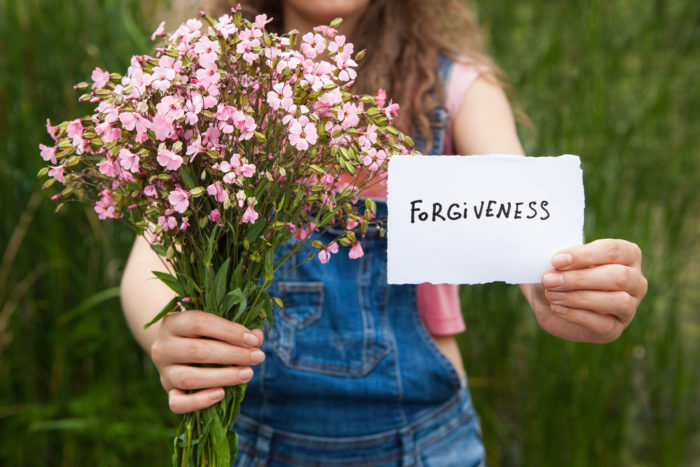5 Reasons Forgiveness is Not a Good Way to Heal

For philosophers and clergy alike, the message is resoundingly clear: Forgive those who have hurt you, because holding on to anger is destructive. Case in point, see the small sampling of widespread broadcasting of such messages below.
Forgiveness is the final form of love
-Reinhold Niebuhr
To forgive is to set a prisoner free, and to realize that the prisoner was you
-Lewis B. Smedes
To err is human; to forgive, divine
-Alexander Pope
Forgiveness is often offered as a powerful solution; as an agent to not only help you heal from painful events but also allow you to move forward.
The general idea is that holding onto anger can make you bitter and hold you back from healing from harm that someone has done you. But the problem is that there are several serious problems with trying to use forgiveness as a solution.
Let’s first look at why it doesn’t work. Then, we will discuss a much better solution.
5 Reasons Forgiveness Does Not Work
- In today’s world, we generally seek to avoid emotions that are unpleasant, like anger and hurt. We naturally believe that we should escape “bad” feelings as soon as possible. Forgive and move on is a logical way to achieve this. However, emotions are not logical, and so this strategy does not work.
- Glossing over unpleasant feelings not only doesn’t work, but it also does not make use of the emotion. For example, hurt and anger carry vital messages from your body to your brain. The message from hurt is, “take care,” and the message from anger is “watch out, and protect yourself.” Before you forgive anyone, it’s vital that you listen to these messages, and heed them.
- True forgiveness is a wonderful thing, indeed. It happens after a process has taken place. This process involves accountability from the person who harmed you. If the person you’re forgiving has not acknowledged his or her harmful act and asked for your forgiveness, then you have not held the individual accountable.
- Forgiving those who have not taken responsibility for their actions falls short of holding them accountable. The offenders will be essentially let off the hook. This robs them of the opportunity to learn from their mistakes.
- Forgiving someone who has not owned up to their actions makes you unnecessarily vulnerable. John F. Kennedy said, “Forgive your enemies, but never forget their names.” In this quote lies a warning that forgiveness can leave you vulnerable to re-victimization. Without your anger and hurt to warn and remind you to protect yourself – and if the person who harmed you has not been held accountable – you are opening yourself up to being harmed again.
Quotes and articles about forgiveness present it as a solution to painful situations.
But forgiveness is not a solution. It’s a process.
The Process of True Forgiveness
- The offender realizes he (or she) has hurt you, perhaps because you have told him; perhaps because he notices your anger or hurt.
- A discussion and/or acknowledgment takes place, in which the offender takes accountability for her actions.
- The offender genuinely feels guilt or remorse and apologizes for his hurtful actions.
- An emotional meeting of the minds takes place in which you feel the remorse and accountability of the offender.
- This emotional meeting of the minds allows you to truly forgive your offender. All is not forgotten, but a mutual understanding has relieved you both.
In the process of true forgiveness, the relationship is changed forever, sometimes in a good way. Many who go through these steps together end up feeling more connected and closer than they were before the offense took place.
When There is No Accountability
Of course, it is true that in many of life’s situations the offender does not notice that she’s hurt you or does not appear to care. There is no accountability, no acknowledgment, no apology. So, sadly, there can be no meeting of the minds. These are some of life’s most difficult and painful experiences.
Here the solution becomes not about forgiveness, but about balance and self-care. If you allow your hurt and anger to rule you, you will be in danger of becoming bitter or vengeful.
Instead, please use your anger and hurt to build and enforce boundaries that will protect you from the other person. Soothe and balance your painful feelings with attention to your own health and recovery. Talk to those who care about you, eat well, and rest. Pay attention to your feelings and manage them.
And always keep in your mind the most healthy and powerful guiding principle for one who has been unjustly harmed and left with no accountability:
The best revenge is living well.
Nothing could be more true.
To learn more about emotions, how they are useful, and how to manage them in relationships, see the books National Bestseller Running on Empty: Overcome Your Childhood Emotional Neglect and Running On Empty No More: Transform Your Relationships.
A version of this article originally appeared on psychcentral.com. It has been republished here with the permission of the author.
